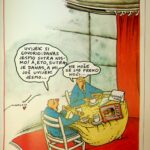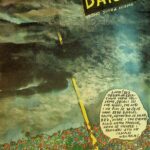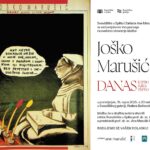At the University Gallery in Split, in partnership with the Ana Marušić Foundation, an exhibition by Joško Marušić entitled “TODAY we are, tomorrow we are not: Cartoons from the weekly Danas (1982–1992)” will open on September 15 at 8 PM and remain on view until September 30. The exhibition will be opened by the author together with Prof. Dragan Ljutić, Rector of the University of Split, and presented by Prof. Ana Marušić and Tea Luburić, prof.
The exhibition brings a selection of political cartoons created during a period of major social and political change, when current events were transformed into witty and sharp commentaries on reality. Visitors will have the opportunity to view 50 reproduced cartoons and 6 originals, works that, in addition to their satirical content, bear Marušić’s recognizable artistic drawing—unique in expression and style. The cartoons from Danas perfectly combine stylized characters, color, and detailed backgrounds with strong satirical metaphors.
As a cartoonist, Joško Marušić particularly distinguished himself in the weekly Danas, where between 1982 and 1992 he developed his recognizable artistic signature. His cartoons did not only ridicule politics but also revealed the absurdities of everyday life, recording the weaknesses and contradictions of society. This is why they still function today both as artistic expression and as valuable historical documents.
In the catalogue foreword, historian Tea Luburić notes:
“In Danas, his cartoons dissected current themes for an entire decade, combining satirical sharpness with a recognizable style. They were small portrayals featuring politicians, bureaucrats, and ‘ordinary people’—all the figures we recognize from our own everyday lives. Under his pen, politics, social deviations, and daily life transform into universal images of human weakness and grotesque. In fact, Marušić’s irony always had two sides: criticism of the system and warmth toward the individual. It is precisely this duality that made his work recognizable and timeless.”
The exhibition at the University Gallery in Split presents a selection of cartoons published in Danas during a key period of recent history. It reminds us of the role of caricature not only as a means of satirical resistance but also as a historical document—bearing witness to the political, social, and cultural processes at the end of the 20th century. And it reminds us of the most important lesson: sometimes the furthest view is through laughter.



